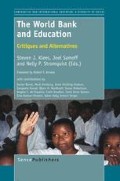Abstract
In the early decades of the World Bank’s ambitious mission of crafting a “World Without Poverty,“ aid to education was accorded low priority among its extensive loan packages and policy formulations aimed at developing nations. Development scholars lamented the World Bank’s benign neglect of education, especially given its directive role in establishing development priorities that were followed by other multilateral and bilateral agencies. The World Bank’s focus for much of the 1960s and 1970s was on large infrastructure projects such as hydroelectric dams, modernizing agricultural production and in the social sectors on reducing maternal mortality, infant mortality and promoting family planning for population control.
Access this chapter
Tax calculation will be finalised at checkout
Purchases are for personal use only
Preview
Unable to display preview. Download preview PDF.
References
Bonal X. Plus ga change …. The World Bank Global Education Policy and the PostWashington Consensus. International Studies in Sociology of Education. 2002;12(1):3–18.
Brown JM, editor. Mahatma Gandhi: The essential writings. Oxford: Oxford University Press; 2008.
Galbraith JK. The Great Crash 1929. Harmondsworth: Penguin; 1954.
Gupta, R. (2010, April 19). The religious lobby and women's rights. Open Democracy, April. http://www.opendemocracy.net
Harvey D. Brief history of neoliberalism. New York: Oxford University Press; 2005.
Heyneman S. The history and problems in the making of education policy at the World Bank 1960-2000. International Journal of Educational Development. 2003;23:315–337.
Hoogvelt A. Globalization, crisis and the political economy of the international monetary (dis)order. Globalizations. 2010;7(1–2):51–66.
Illich I. Deschooling society. New York: Harper and Row; 1971.
Keynes, J. M. (1973 [1936]). The general theory of employment, interest, and money. London: Macmillan.
Li TM. Make live or let die: Rural dispossession and the protection of surplus populations. Antipode: Journal of Radical Geography. 2009;41(1):66–93.
Marx, K. (1990 [1867]). Capital, Vol. 1. London: Penguin Books.
Mundy K. Educational multi-lateralism and world (dis)order. Comparative Education Review. 1998;42:448–478.
Mundy K. Retrospect and prospect: Education in a reforming World Bank. International Journal of Educational Development. 2002;22:483–508.
Nisar MA. Education, religion and the creation of subject: Different educational systems of Pakistan. Pakistaniaat: A Journal of Pakistan Studies. 2010;2(1):46–61.
Nyrere, J. K. 1982 [1967]. Education for self-reliance and freedom and socialism. Published in Education for liberation and development: The Tanzanian experience. Paris: UNESCO.
Patel R. Stuffed and starved: The hidden battle for the world food system. New York: Harper Collins; 2008.
Pereira LC. Development economics and the World Bank's identity crisis. Review of International Political Economy. 1995;2(2):211–247.
Polanyi K. The great transformation. The political and economic origins of our times. New York: Farrar and Rinehart; 1944.
Post D, Clipper L, Enkhbaatar D, Manning A, Riley T, Zaman H. World Bank okays public interest in higher education. Higher Education. 2004;48(2):213–229.
Reimers F. Education and structural adjustment in Latin America and sub-Saharan Africa. International Journal of Educational Development. 1994;14(2):119–129.
Samoff J, editor. Coping with crisis: Austerity, adjustment and human resources. Paris: UNESCO; 1994.
WAF-SBS. (2007, January). Joint statement by the WAF-SBS Commission on Integration and Cohesion. Women Against Fundamentalism and Southall Black Sisters.
World Bank. (2008). World Development report. Agriculture for development. Washington, D.C.: World Bank.
World Bank. New world, new World Bank Group: (I) Post-crisis directions. Development Committee (Joint Ministerial Committee of the Boards of Governors of the Bank and the Fund): Washington D.C; 2010.
World Bank. Learning for ll: Investing in people's knowledge and skills to promote development, World Bank Group Education Strategy 2020. The World Bank: Washington D.C; 2011.
Zia AS. The reinvention of feminism in Pakistan. In: Azim F, Menon N, Siddiqi DM, editors. Feminist review, Issue 91, South Asian feminisms: Negotiating new terrains. London: Palgrave Macmillan; 2009a.
Zia AS. Faith-based politics, enlightened moderation and the Pakistani women's movement. Journal of International Women's Studies. 2009b;11(1):225–245.
Author information
Authors and Affiliations
Editor information
Editors and Affiliations
Rights and permissions
Copyright information
© 2012 Sense Publishers
About this chapter
Cite this chapter
Kamat, S. (2012). The Poverty of Theory. In: Klees, S.J., Samoff, J., Stromquist, N.P. (eds) The World Bank and Education. Comparative and International Education, vol 14. SensePublishers, Rotterdam. https://doi.org/10.1007/978-94-6091-903-9_3
Download citation
DOI: https://doi.org/10.1007/978-94-6091-903-9_3
Publisher Name: SensePublishers, Rotterdam
Online ISBN: 978-94-6091-903-9
eBook Packages: Humanities, Social Sciences and LawEducation (R0)


